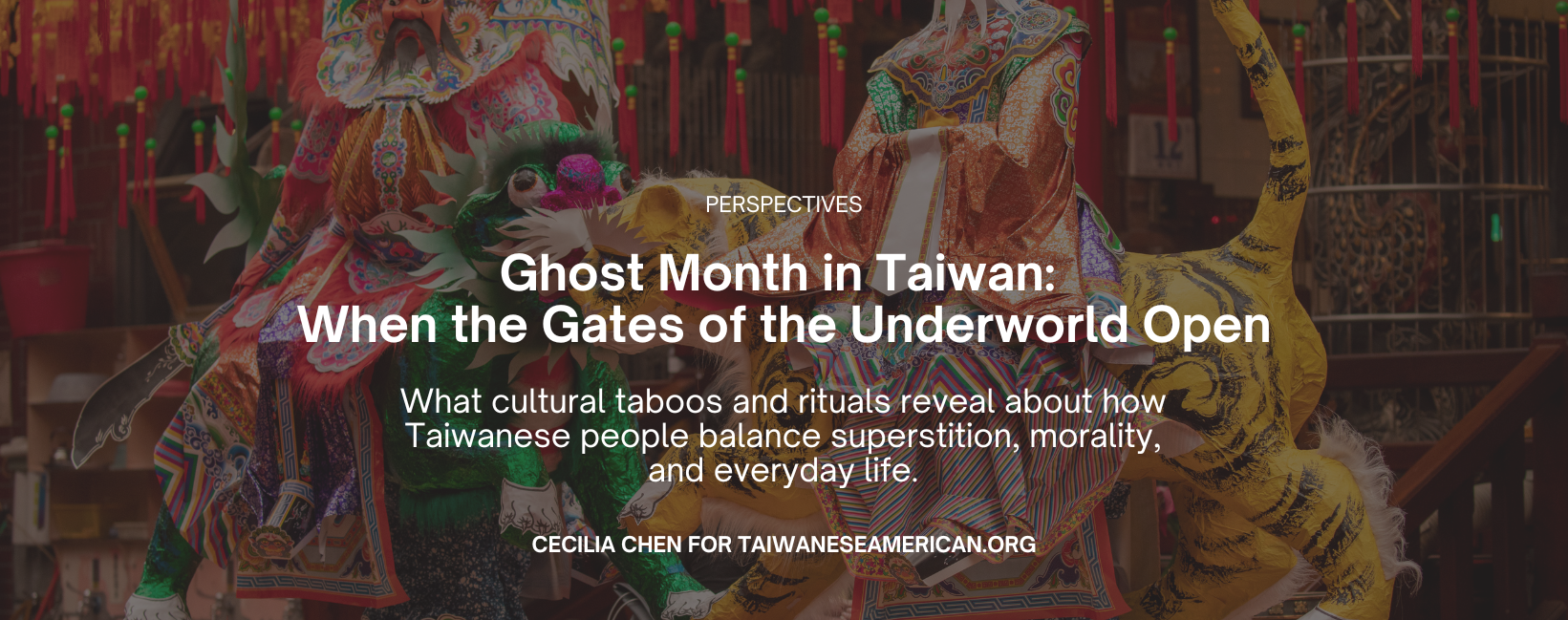
It is currently Ghost Month in Taiwan, also known as 中元節 (Zhōngyuán Jié / Ghost Festival), a traditional holiday observed on the 15th day of the 7th lunar month, usually in August. It is believed that during this time, the gates of the underworld open, allowing spirits to roam the human world. The festival has roots in Taoism, Buddhism, and folk beliefs. In Taoism, it is tied to the birthday of the deity Dì Guān (地官大帝), who pardons sins. In Buddhism, it corresponds to Ullambana, a day when souls can be saved from suffering, inspired by the story of Mulian saving his mother from hell. In folk traditions, it focuses on appeasing wandering or hungry ghosts to avoid misfortune. Unlike Mexico’s Día de los Muertos, which is filled with joy, dancing, and music, the Zhongyuan Festival in Taiwan carries a much more solemn and fear-based tone.
As a Taiwanese and Mandarin teacher, I’ve had opportunities to be exposed to many cultures. I find it fascinating that while festivals like these across cultures share the purpose of remembering loved ones, in Taiwan the tone is more solemn and respectful rather than playful or celebratory. It makes me reflect on how cultural values shape the way we approach life and remembrance. You’ll understand what I mean when you hear about the many taboos that people observe during this month.
For example, people say you should avoid hanging clothes outside at night, since spirits might attach themselves to the laundry and bring misfortune to the family. Another taboo is cutting your nails at night, which is believed to attract ghosts. A common saying even warns that cutting your nails late will shorten your parents’ lifespan—something that clearly reflects the deep cultural value of filial piety. Personally, I’ve caught myself thinking, “Oh, it’s time to trim my nails,” only to realize it was already nighttime and decide against it. It’s not that I truly believe a ghost will appear, but the taboo is still embedded in my subconscious.
Other taboos include avoiding swimming or going near the sea, since it is believed spirits—especially those who drowned—might try to pull people into the water. Growing up, I often saw news reports about drowning accidents that seemed to happen especially often during this month (but I also think people go to the sea more often because you know how hot the Taiwan summer is, right?).
There’s also the belief that you shouldn’t whistle at night, as spirits might mistake it for someone calling them and follow the sound home. But this taboo also has a historical background from the Japanese colonial period in Taiwan. At that time, whistling at night was seen as suspicious, because it could be mistaken for a secret signal between criminals or rebels. People who did it risked being arrested by the police or military police. Some say that people wanted to prevent this from happening, so they just told children, “Don’t do it, otherwise the ghost will come and get you.” Over time, this rule blended with traditional beliefs and became a cultural taboo that many people still follow today.
On top of that, people avoid wearing all black, all white, or all red, cutting hair, or tapping someone on the shoulder at night. It’s also considered inauspicious to get married or move into a new house during Ghost Month. The list goes on and on. When I look into the origins of these taboos, I often find that beyond religion, many serve a social function: we use a lot of fear to keep people in line. In fact, we even have a saying: “不做虧心事,不怕半夜鬼敲門 — If you do no wrong, you don’t need to fear ghosts knocking at your door at midnight.”

To me, Ghost Month has always been a reminder of how much our social behavior is shaped by fear. Even outside of Ghost Month, I notice it in everyday life. For example, I often hear parents warning misbehaving children in restaurants: “If you don’t behave, I’ll ask the police officer to come take you away!” Or adults telling kids not to pick up coins from the ground because “人在做天在看 — heaven is watching.”
Many say Metro stations in Taiwan are so clean, but most of the time, what people actually think is: if you drink or eat in the metro, you will be fined.
A recent example is that you probably already know Taiwan has a notorious reputation as a “行人地獄 — pedestrian hell.” On June 30, 2023, an amendment to the Road Traffic Safety Rules came into effect, clearly stipulating that when vehicles approach a pedestrian crossing, they must stop and yield if a pedestrian is crossing, regardless of whether there are traffic signals or police officers present. Violators face fines of up to NT$6,000, receive violation points, and may be required to attend a road safety course. I personally had some horrendous experiences crossing the road and almost getting hit. But guess what? Right after this new regulation was enforced, I almost immediately noticed improvement!
Of course, I believe most Taiwanese people don’t do bad things because of their inherently kind nature. As for myself, I like the metro to be clean, I would never want to take things that do not belong to me, and if I drive, I want to be nice to the pedestrians. But deep down, there’s always that subconscious voice: if you do something wrong, you will be punished.
Once I was showing my student around Taipei, and my student was even shocked that there are instruction lines on the floor. She said: “This is incredible! Why do you need so many rules?” It was interesting to me.
About the Ghost Month taboos, nowadays, many young people don’t really care about them, but I often see posts online where they complain about their parents’ superstitions. Once I read about a young woman who happily told her mom: “We’re going to Phu Quoc Island next week!” only to receive the reply: “Why would you choose this month? Ghost Month is not a time for mountains or the sea—are you trying to challenge fate?” For me, it’s fascinating to see how these traditions continue to shape the older generation’s worldview, while the younger generation grows more distant from them.
Perhaps that’s the question Ghost Month leaves us with today: instead of relying on fear to maintain order, maybe we can learn to trust the natural kindness and morality within us. Peace doesn’t always have to come from fear and force—it can also come from our shared humanity.
Cecilia Chen was born and raised in Taiwan. She is a Mandarin teacher who focuses on teaching how Taiwanese people really speak in everyday life and on the streets. She hopes to use the power of social media to help more people discover and connect with Taiwan. With 10 years of teaching experience, she is also active on Instagram and YouTube, and has a deep interest in exploring cultural dynamics.
It was only after becoming a Taiwanese Mandarin teacher that she began to view her own culture with greater curiosity and appreciation, constantly gaining new perspectives through her interactions with students from around the world.




Leave a Reply